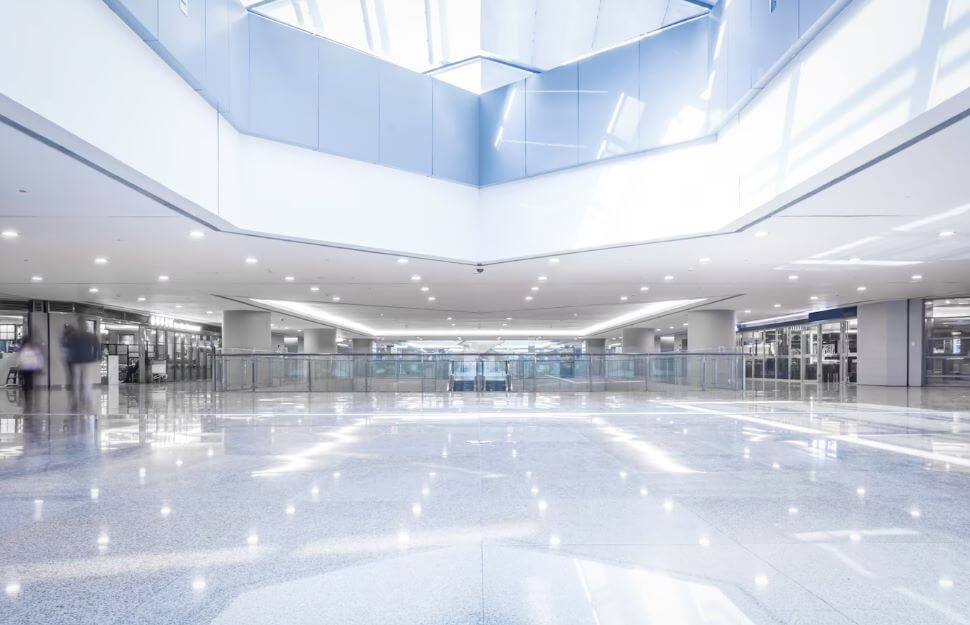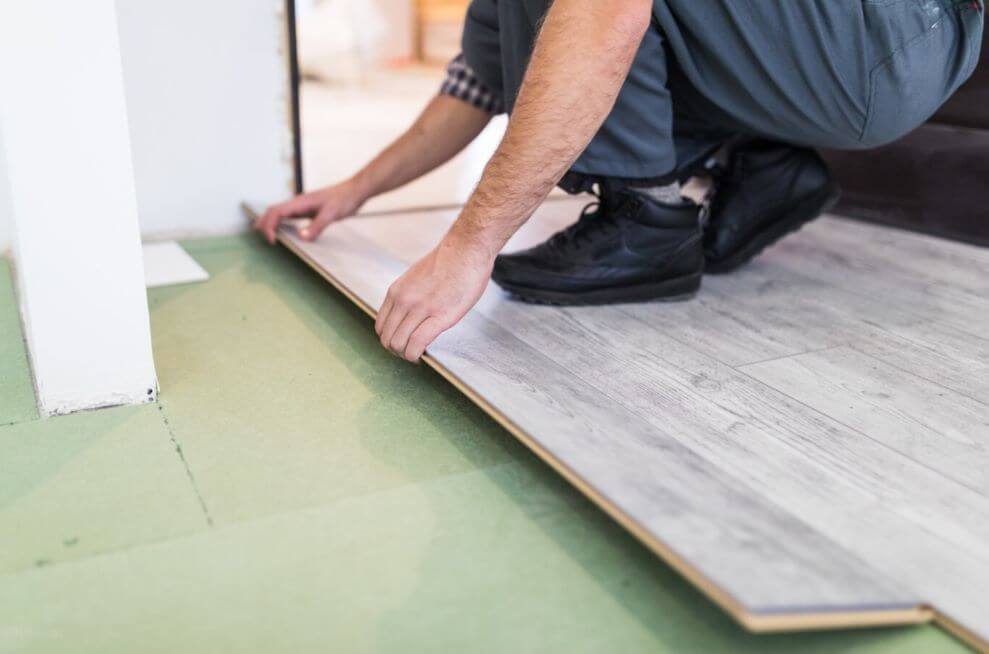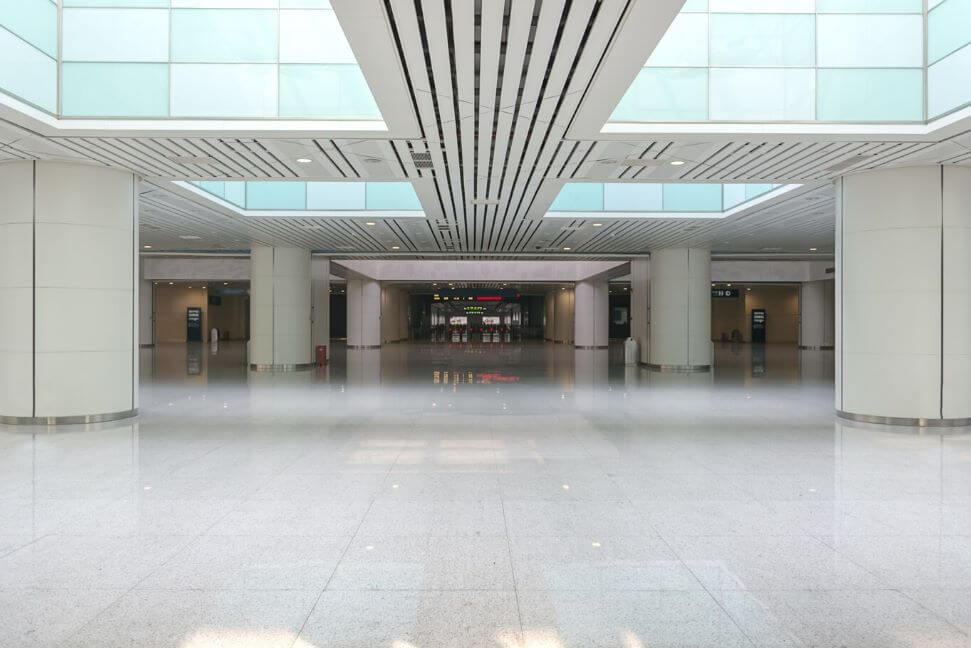It's crucial to maintain brand consistency while creating an inviting and exciting atmosphere for customers in any size retail space. In business, perhaps nowhere is the adage "You never get a second chance to make a first impression" more true than in the realm of consumer goods.
Choosing an appropriate retail flooring material is an important step in this direction. There is nothing like a retail setting in the business world. Constant foot traffic, and maybe the use of shopping carts, wheelchairs, strollers, and dollies, necessitates a design that is not only aesthetically beautiful but also brand-appropriate. Because of this, picking the right flooring for a store is essential.
Selecting Appropriate Flooring For Your Retail Fitout
Evaluating Your Retail Space
Knowing your shop space inside and out is crucial when deciding on the best flooring for your retail fitout. Depending on their purpose and the client traffic they receive, various parts of your store may have varying needs.
The regular foot traffic in and out of your store necessitates flooring that can take it. Similarly, high-traffic areas like aisles, entrances, and checkout lanes should have flooring materials that can withstand significant wear and tear from customers' feet. The longevity and low maintenance requirements of vinyl, tile, or concrete make them excellent choices.
Aesthetics And Branding
Choosing flooring that works with your brand's aesthetic and the overall look of your business is an important step in making your retail space unified and effective. The ideal flooring for a retail space would reflect the values of the company, appeal to its demographic, and enhance the customer's time spent there.
The flooring in your store should reflect the high-end nature of your product line. Using luxurious materials such as polished marble, high-quality oak, or even real stone can give a room an air of luxury and refinement. These materials are not only aesthetically pleasing but also long-lasting, so the opulent feel of your store won't be short-lived. These high-end flooring choices, with their sophisticated textures and vivid hues, can improve the shopping experience for your most discerning customers.
Upkeep And Durability

Since retail locations tend to see a lot of foot traffic, it's important to choose flooring that requires minimal upkeep in order to protect it from wear and tear. Spills, grime, and debris are unavoidable in a busy retail setting. Select flooring that requires little work to clean and maintain to save yourself time and energy over time. Mopping, sweeping, or spot-cleaning smooth surfaces like polished concrete, vinyl, or tile is usually sufficient to keep them clean.
Some flooring materials are more vulnerable to scratches and abrasions from heavy foot traffic, trolleys, carts, and other equipment. Select flooring that can withstand scuffs and wear to keep your store looking brand new. Consider investing in high-quality hardwood with a protective finish if you're set on installing hardwood flooring, as this material is susceptible to scratches.
On the other hand, ceramic and porcelain tiles are resistant to scratches and can survive heavy foot traffic in a store. Floors in stores must be durable enough to withstand heavy foot traffic without being severely damaged. Try to find resilient and long-lasting flooring options, like vinyl or laminate.
Comfort
When discussing ease, let's not overlook convenience. Customers and employees will have a better time shopping if the floor is pleasant to stand and walk on. Since most retail workers spend most of their shifts on their feet, it's in everyone's best interest to install a floor that provides comfort and support for their feet, legs, and backs. If you want a calmer, more pleasant location to work, sound insulation, which is commonly supplied by flooring underlayment, is something to think about.
Prioritising Safety
The safety of both employees and consumers should be given first consideration in any retail setting. The flooring of a store is crucial to the safety of the customers since it provides slip resistance and reduces the likelihood of accidents. Although slip and fall incidents are always a possibility, they are more likely to occur in heavily trafficked retail establishments. Customers' attention may wander as they browse or carry luggage, increasing the risk of falls.
Slip-resistant flooring should be prioritised when possible to reduce the likelihood of mishaps like this. Slip and fall accidents typically occur in high-traffic areas like entrances, checkout lanes, and aisles. Special care must be taken when deciding on a floor for these spaces. High-traffic areas benefit greatly from resilient and slip-resistant materials, such as vinyl or non-slip tiles.
Assessment Of Budgets
Although it is simple to squander the budget on luxurious carpeting, you should try to be as practical as possible. Examine the cost of each potential flooring choice, which should include the cost of labour and any necessary materials, before making a final decision. When it comes to getting the most out of your budget while still obtaining the style and feel of your dream fit out, specialists can be of great assistance.
Advice On Flooring Selection For Retail Spaces
- Tiles, vinyl flooring, and timber floors are all suitable options for big commercial or industrial spaces. They are impervious to water, tough against wear, and simple to disinfect. It can ensure that the floor is sturdy and won't get harmed even under heavy foot traffic.
- Flooring options like polished hardwood or plush carpeting help create the opulent atmosphere expected by shoppers at high-end boutiques. Make more people want to shop at your store by making it look appealing.
- More variety exists in the smaller settings that serve fewer customers. Remember that in enclosed areas, noise can play a significant role. Pick carpet if you want it to be cosy and peaceful, or go with tile or hardwood to make the room seem more expansive. Quick-step, magnificent floors are a great option for this situation.
Pros And Cons Of Several Flooring Options Commonly Used In Retail Spaces
Laminate

Laminate flooring is less expensive than hardwood, stone, or tile options. It lasts a long time and is simple to care for. Laminate flooring is versatile and may be installed anywhere from a low-traffic home to a busy office, kitchen, waiting area, or corridor.
The benefits can't be denied. It's an inexpensive substitute for more expensive materials like stone, hardwood, or tile, and it's also very scratch- and water-resistant. Second, it's easy to set up in a short amount of time and provides a comfortable alternative to cold, hard surfaces. Additionally, laminate is low-maintenance and simple to clean.
Despite its many advantages, it has also had disadvantages. It has a smaller waterproofing effect than hardwood, needs to be replaced more often, and can't be fixed. Second, because the pattern is repeatable, it is conceivable for two identical boards to be put next to one another if care is not taken during installation. Laminate also has poor acoustic properties. Retailers who have a greater demand for noise absorption should look elsewhere.
Carpet Tiles
Installing carpet tiles in public and commercial areas is becoming increasingly common. In addition, carpet tiles can offer a variety of possibilities for patterns that are original and contemporary. Carpet tiles are a common flooring option in public locations, including waiting areas, businesses, and classrooms.
Carpet tiles are widely used because of their acoustic insulation qualities and the durability they exhibit in high-traffic areas. It's pretty good when it comes to the price. However, because dirt and stains are more easily visible on their surface, carpet tiles require more maintenance than hard surface flooring options such as hardwood and laminate.
Vinyl Composite Tile (Vct)
VCT, like carpet tiles, is gaining popularity as a low-priced choice for commercial building flooring. Vinyl composite tiles are widely utilised in commercial buildings such as clinics, offices, and stores. It's resistant to wear and tear from heavy foot traffic, comes in a wide range of colours and styles, and is flexible enough to avoid damage from scratches.
Many people equate it with cold and sterile environments, such as a hospital; the floor surface must be scrubbed and reapplied frequently, increasing the maintenance requirements, and the maintenance expenses may exceed the initial investment if proper care is not done. When compared to vinyl, its durability suffers.
Natural Hardwood Flooring
Many people still prefer natural hardwood flooring in luxury office settings since it is widely regarded as the most aesthetically pleasing option. Its traditional style will complement any modern workplace. Natural hard flooring is adaptable to a wide range of settings, from offices and kitchens to retail and design studios. It is totally up to you and your budget.
The most obvious benefit is how stunning it looks. It lasts a long time and is simple to keep tidy. In addition, you can choose a classic or contemporary look depending on what you think will work best for your company.
The high cost could be the deciding factor. Additionally, twice-yearly repairs are required for maintenance, with frequency varying with the severity of damage (scratches and defects). When it comes to noise control, natural hard flooring could be more effective. The noise from walking on hardwood makes it inappropriate for noise-sensitive environments.
Vinyl Plank Flooring
The durability and resilience of vinyl plank flooring have contributed to its meteoric rise in popularity. The price is reasonable, and the process of installation is straightforward. It's appropriate for restaurants, cafes, workplaces, and other commercial settings.
Water and wear are not problems for vinyl plank flooring. Because of the floor's high wear resistance coefficient, it can withstand heavy foot traffic for longer before needing to be replaced. Second, vinyl plank flooring is easy to set up and keep clean. Maintaining its pristine condition only requires routine washing and mopping. Simple cleaning procedures can significantly minimise the time and resources needed to maintain a commercial space, especially one with a high foot traffic.
In addition, vinyl plank flooring is intended to be warmer and cosier underfoot than hard surfaces like hardwood or tile. Vinyl plank flooring offers greater acoustic performance and reduces noise more effectively than laminates. Allow the floor to convey pleasure to the user.
One major drawback is the quite lofty ground level. Vinyl plank flooring is thinner and more pliable than other types of flooring since vinyl is a softer substance. Wear materials can become clumped together by even minor projections, leading to issues with hastened wear. Vinyl plank flooring is unique from other types of flooring in that it must be installed over a precisely flat and smooth subfloor. Vinyl plank flooring is also vulnerable to damage since it is thin and flexible, making it easier to be punctured by sharp items or crushed by heavy objects.
Each flooring material has its quirks and advantages. The greatest flooring for a retail establishment is one that is durable, low-maintenance, and within the owner's price range and style preferences.
Conclusion
Large commercial or industrial areas can use tiles, vinyl flooring, or wood floors because they last a long time, don't get damaged by water, and are easy to clean. Laminate flooring is less expensive than hardwood, stone, or tile, and it is durable, doesn't scratch easily, and is simple to clean. But it has some problems, like not sealing as well as other materials, needing to be replaced often, and not being very good at blocking noise. Because they last a long time and block out noise, carpet tiles are popular in public and business places.
It is becoming more common to use vinyl composite tile (VCT) for the floors of businesses because it is inexpensive. Because it is flexible, it won't get damaged by scratches and can handle a lot of foot traffic. It also comes in many colours and styles. But it needs more upkeep than hardwood, and it doesn't last as long.
Natural hardwood flooring is popular in high-end offices because it looks classic and can be used in a variety of places. It looks nice, but it costs a lot and needs to be fixed every two years. Vinyl plank flooring is strong and long-lasting, so it can be used in places like bars, restaurants, and offices. It can handle a lot of foot activity, is simple to clean, and blocks out noise better. The ground level is high, though, so it needs to be put down on top of a flat, smooth surface.
The best flooring for a store should last a long time, be easy to clean, and fit the owner's budget and style tastes.
Content Summary
- Understand how to choose the right flooring for retail fitouts.
- Brand consistency in retail space design is crucial.
- A store's flooring plays a vital role in making a first impression.
- Retail flooring should be both aesthetically pleasing and functional.
- Recognise the specific needs of different areas within your store.
- High-traffic areas demand durable flooring solutions.
- Vinyl, tile, and concrete offer longevity and ease of maintenance.
- Flooring choices should resonate with a brand's aesthetic.
- High-quality materials like marble enhance the shopping experience.
- Ensure the retail flooring mirrors the nature of your product line.
- Polished marble, oak, and stone exude luxury.
- Retail locations are prone to spills and dirt.
- Choose flooring that is easy to clean and maintain.
- Avoid materials that are easily scratched or damaged.
- Consider protective finishes for hardwood flooring in stores.
- Ceramic and porcelain tiles are ideal for high-foot-traffic areas.
- Invest in durable and resilient flooring like vinyl or laminate.
- A comfortable floor enhances the customer and staff experience.
- Consider sound insulation for a pleasant shopping environment.
- Prioritise the safety of customers and staff when choosing flooring.
- Slip-resistant flooring can prevent accidents in retail spaces.
- Retail store budget assessments are essential before flooring selection.
- Get expert advice to maximise your flooring budget.
- Tiles and vinyl flooring are suitable for large commercial spaces.
- High-end boutiques may prefer polished hardwood or plush carpeting.
- For smaller settings, consider noise level and comfort.
- Laminate flooring offers cost-effectiveness and versatility.
- Carpet tiles are popular for their contemporary design possibilities.
- Carpet tiles excel in acoustic insulation for high-traffic areas.
- Vinyl Composite Tile (VCT) is a budget-friendly choice for commercial spaces.
- Natural hardwood flooring complements luxury office settings.
- The beauty and longevity of hardwood flooring are unmatched.
- Vinyl plank flooring has gained popularity due to its durability.
- Vinyl plank flooring offers cost-effectiveness and ease of installation.
- It excels in wear resistance and is ideal for high foot traffic areas.
- Enjoy the warmth and comfort of vinyl plank flooring underfoot.
- Vinyl plank offers superior acoustic performance over laminates.
- Each flooring type has its unique set of advantages and disadvantages.
- The best retail flooring balances durability, aesthetics, and budget.
- Retail environments require slip-resistant materials in high-traffic areas.
- Understand the maintenance needs of each flooring type.
- Materials like porcelain tiles resist scratches and endure heavy traffic.
- Luxurious materials enhance the overall brand image in retail spaces.
- Aesthetics and branding are essential when selecting retail flooring.
- A well-chosen floor can elevate the overall shopping experience.
- Employees benefit from comfortable flooring during long shifts.
- Safety considerations should always be paramount in retail spaces.
- Noise can impact the ambience in enclosed retail areas.
- Budget constraints should be considered when choosing luxury materials.
- Experts can guide you in making the most of your retail flooring budget.
Frequently Asked Questions About Retail Fit-Out
LVT and hardwood are the best choices for the performance of retail flooring. Both solutions are durable, dependable and cost-effective — and with proper maintenance, hardwood can last hundreds of years.
While the look of a restaurant's floor is important, it must be durable, safe, and easy to clean. Tile, cork, hardwood, laminate and vinyl are often good restaurant flooring choices. For an upscale restaurant, carpet may be a good choice regarding aesthetics and its ability to minimize noise.
Choosing the right type of flooring can completely transform the look and feel of any space, so it's important to consider when renovating your rooms or hallways. Flooring is just as much about practicality as aesthetics, which means that finding the right option is more than just what looks good.
Both broadloom and carpet tiles are sustainable options, though carpet tiles will cut down on waste during maintenance and installation; if there's a stain, you only have to replace a single square. Finally, the carpet can be easily cleaned and is durable, making it suitable for many years of use.
One of the fastest-growing trends in flooring is a return to classic, natural materials that grow more beautiful as their finely aging character develops over time. The most popular materials date back to the ancient Greek, Egyptian and Roman civilizations.

